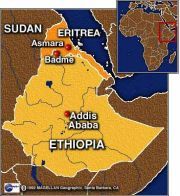Eritrea, Ethiopia trade blame for border stalemate – UN
Jan 17, 2006 (NAIROBI) — Eritrea and Ethiopia are continuing to blame each other for their border stalemate, the United Nations said Tuesday as a US diplomatic delegation prepares to visit the region in a bid to avert a new war between the two neighbors.
 The UN Mission in Ethiopia and Eritrea (UNMEE) said the two sides had renewed mutual recriminations during a meeting last week of a joint military commission that reviewed the border situation after months of heightened tensions and fears of a resumption in the conflict.
The UN Mission in Ethiopia and Eritrea (UNMEE) said the two sides had renewed mutual recriminations during a meeting last week of a joint military commission that reviewed the border situation after months of heightened tensions and fears of a resumption in the conflict.
Eritrea renewed complaints that the UN Security Council is biased in favor of Ethiopia. The council has threatened sanctions against both countries if they do not reduce troop levels on the border and against Eritrea if it does not lift restrictions imposed on UNMEE.
Asmara’s representative at the January 13 talks in the Kenyan capital said the world body had unfairly praised Ethiopia for withdrawing troops in compliance with the Security Council’s November Resolution 1640 because Eritrea had not deployed soldiers to the border.
Eritrean Colonel Zecarias Ogbagaber “said that his country is in serious disagreement with Resolution 1640, and felt it was one-sided, pointing out that Eritrea had never moved large amounts of troops to the forward areas in the first place, and did not merit being included in the demand for troop withdrawal,” UNMEE said in a statement.
Instead, Zecarias took issue with the council’s failure to threaten Ethiopia with sanctions over its refusal to accept a 2002 border demarcation that emanated from the peace deal that ended their 1998-2000 war.
“While expressing his reservations on the troop withdrawal by Ethiopia, he pointed out that the main cause of the stalemate is Ethiopia’s refusal to accept the decision of the boundary commission, and this has not been addressed,” UNMEE said in its account of the meeting.
At the same time, Ethiopia’s representative, Major General Yohannes Gebremeskel, “expressed serious doubts over (Eritrea’s) continued restrictions imposed on UNMEE … which he said prevents UNMEE staff from conducting their usual business to support the peace process,” it said.
In October, in a show of displeasure over the UN’s failure to deal with Ethiopia’s refusal to accept the border delineation, Eritrea banned UNMEE helicopter flights and limited its ground patrols.
After the Security Council sanctions threat, Eritrea expelled all of UNMEE’s North American and European staff from its territory.
UNMEE gave no explanation for why its account of the meeting was released four days after the talks, but said conditions along the border, which it had earlier described as “tense and potentially volatile,” had declined since the redeployment of Ethiopian troops.
The meeting was held shortly after the United States announced it would send a senior diplomat and a military expert to Eritrea and Ethiopia to look into how to jumpstart moribund talks on implementing the border ruling.
Dates for the visit of Assistant Secretary of State Jendayi Frazer and retired Marine General Carlton Fulford have not yet been announced but they are expected in the region later this week, US officials say.
Some 80,000 lives were lost in the two-year border war which ended with a 2000 peace agreement in which both countries pledged to respect a new border demarcation to be decided by an independent international panel.
Two years later, the panel awarded the flashpoint town of Badme to Eritrea and Ethiopia has refused to accept implementation of the ruling, prompting Asmara to warn that a new war is loooming.
(ST/AFP)
